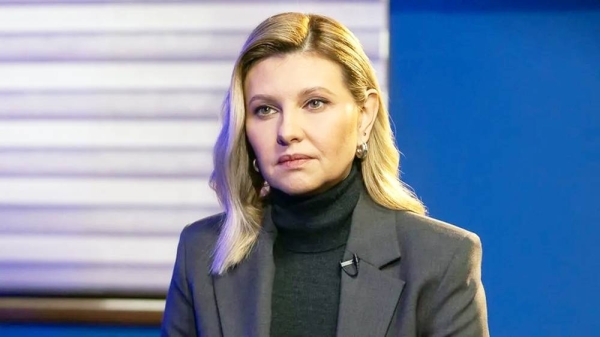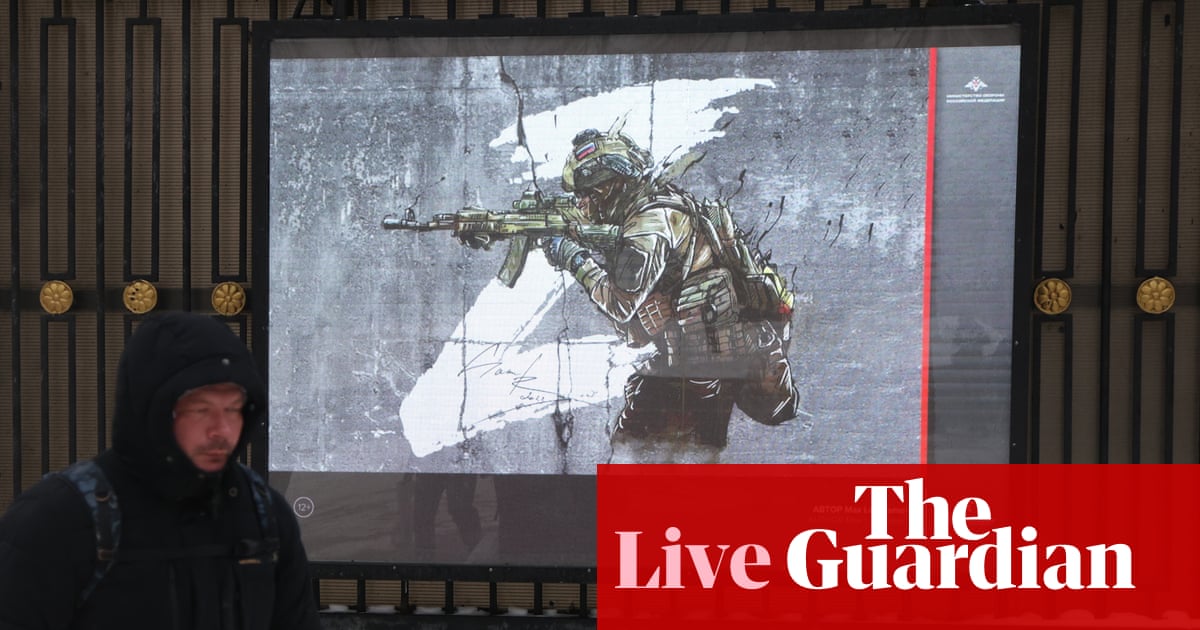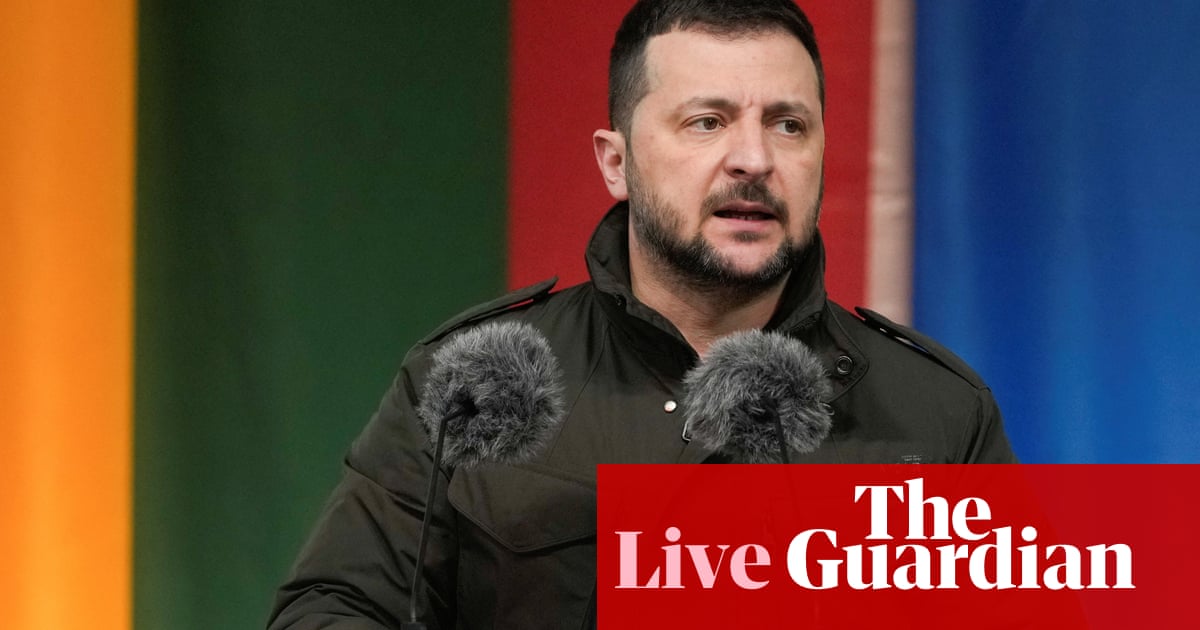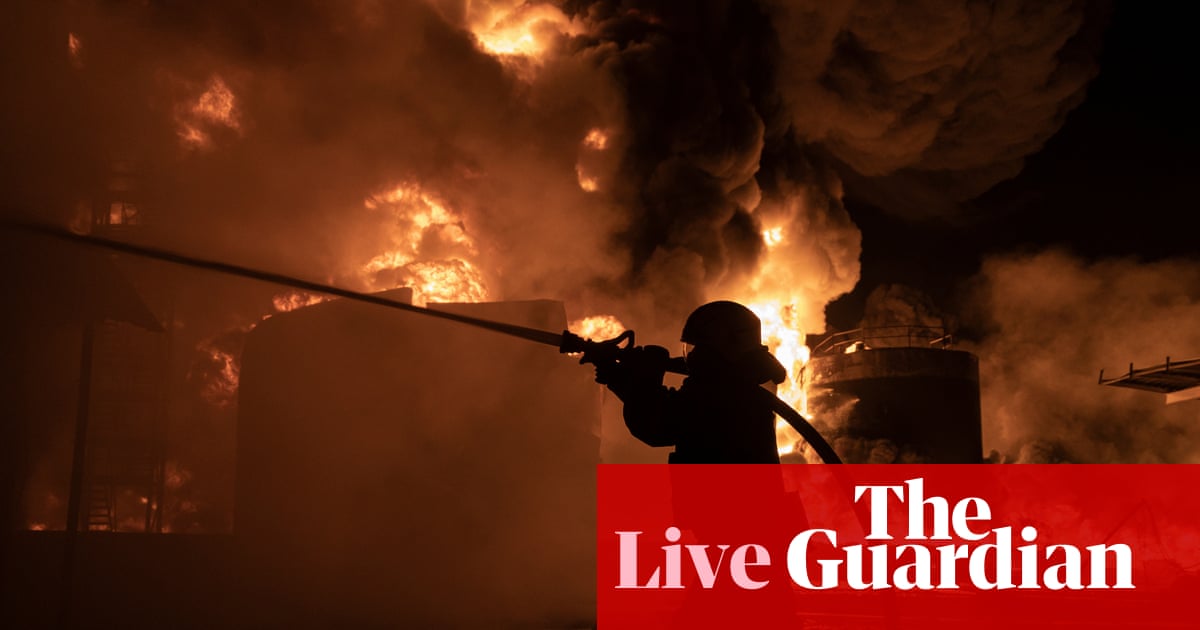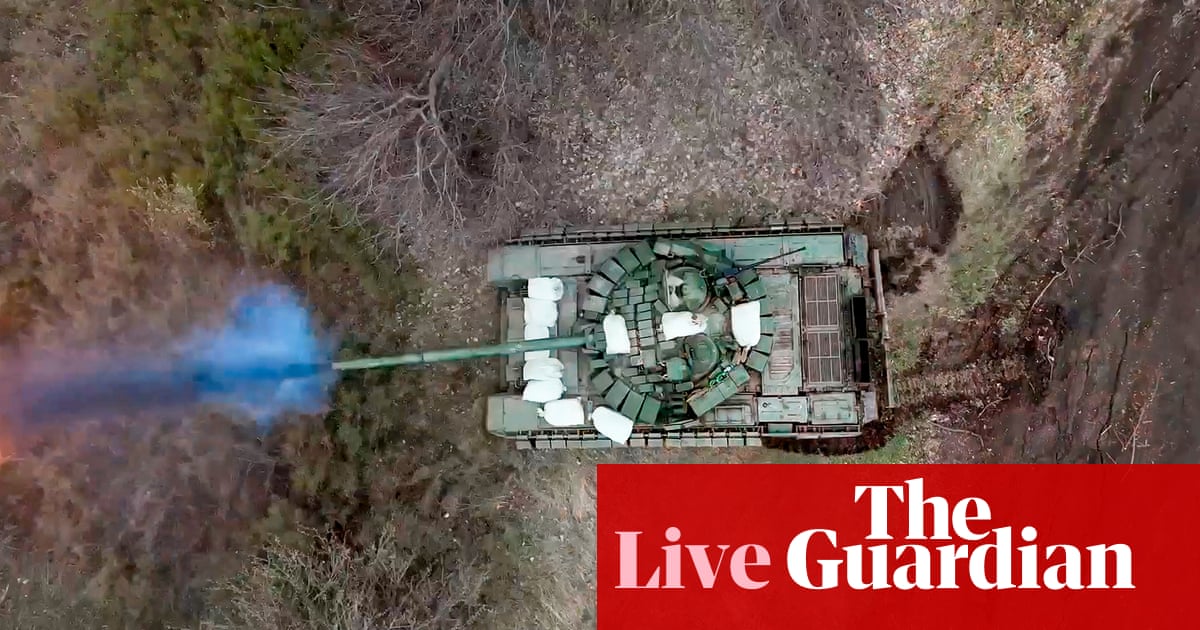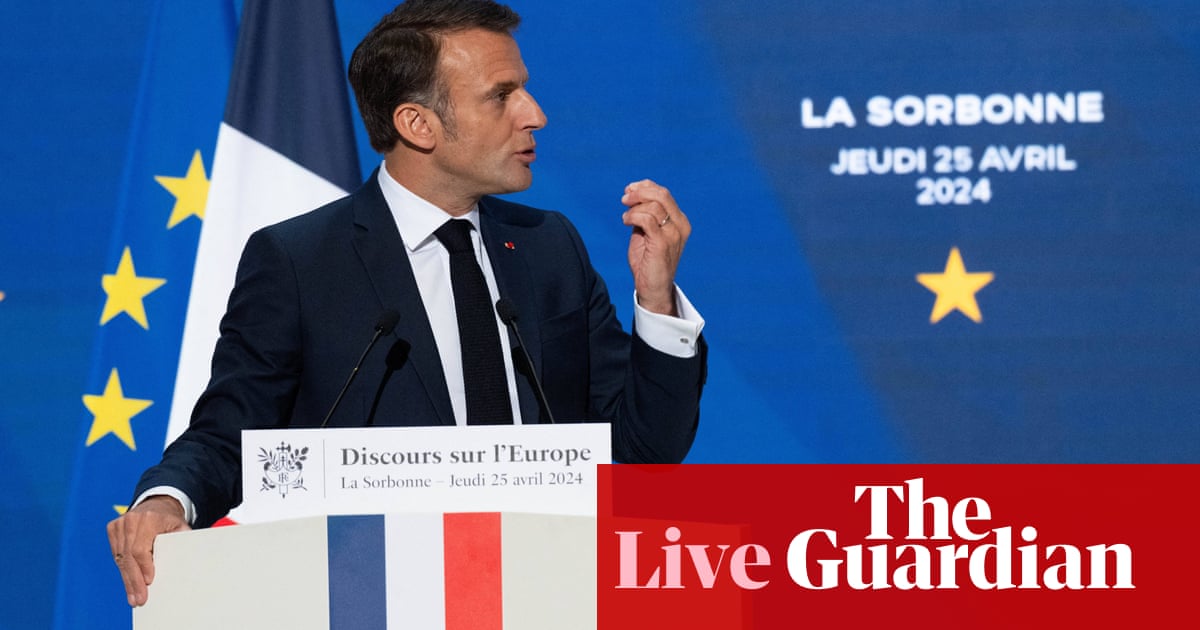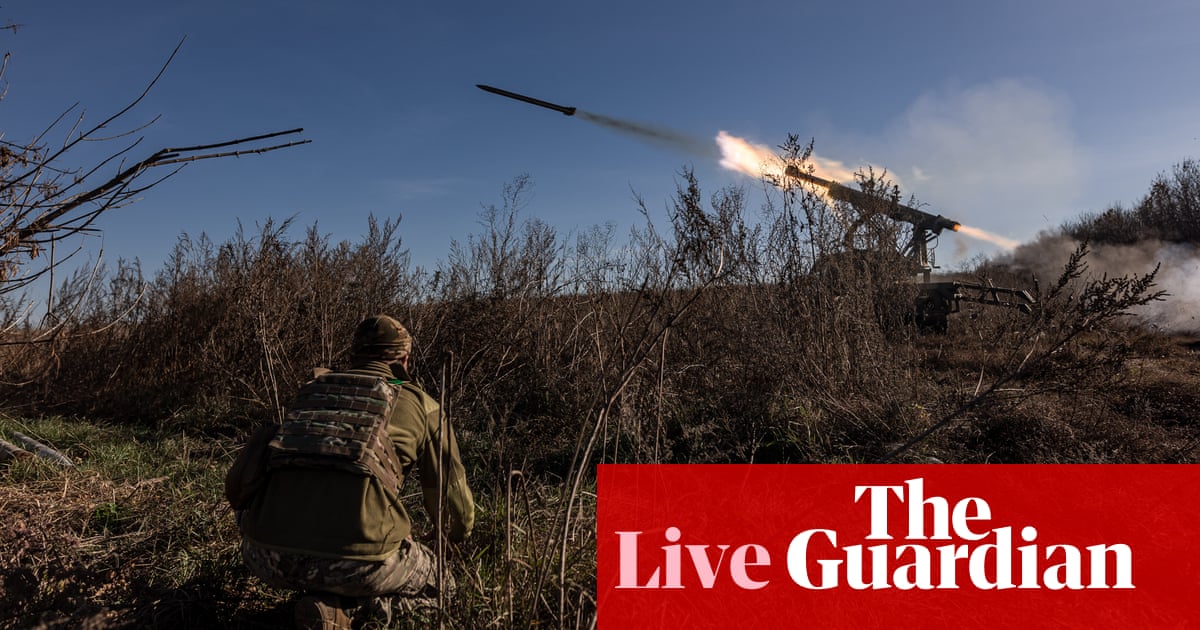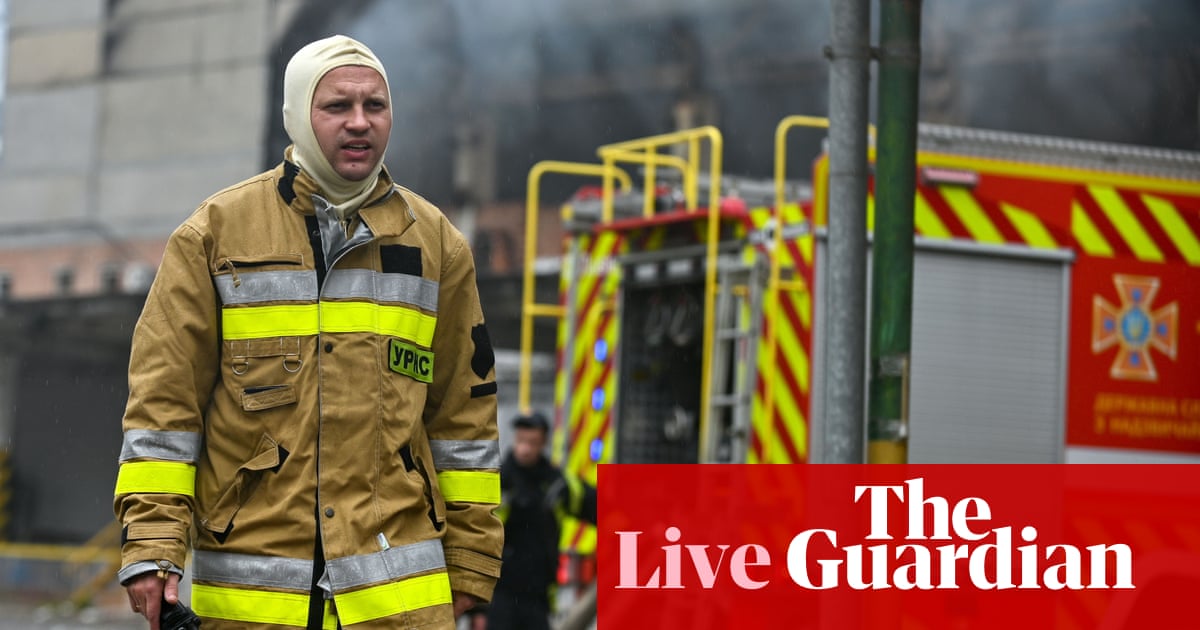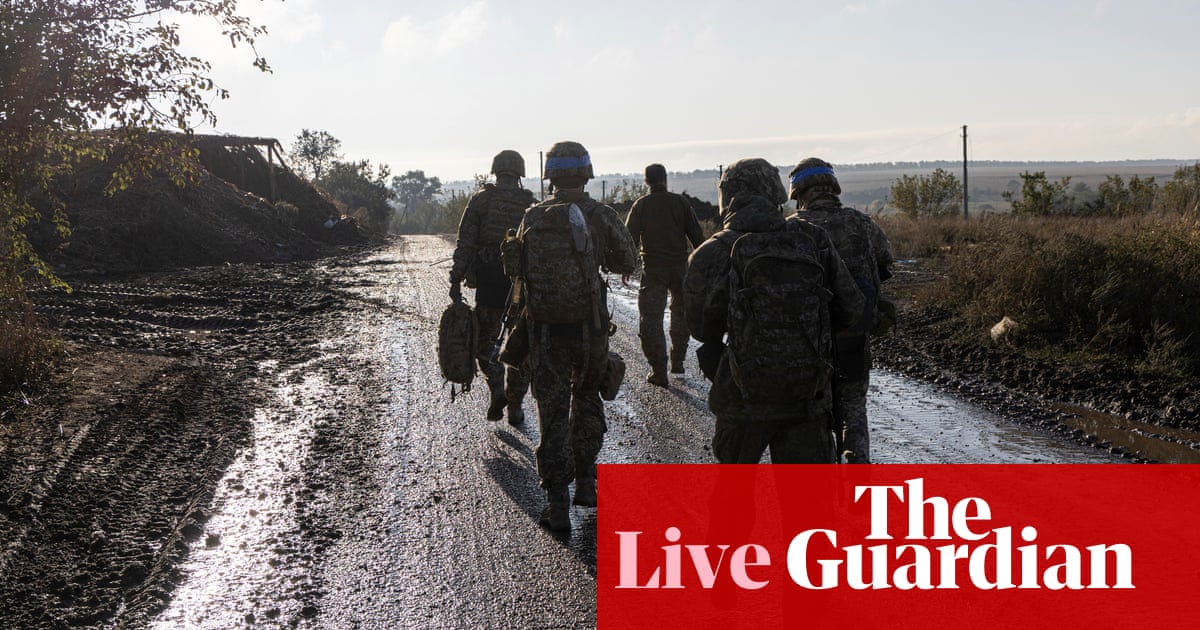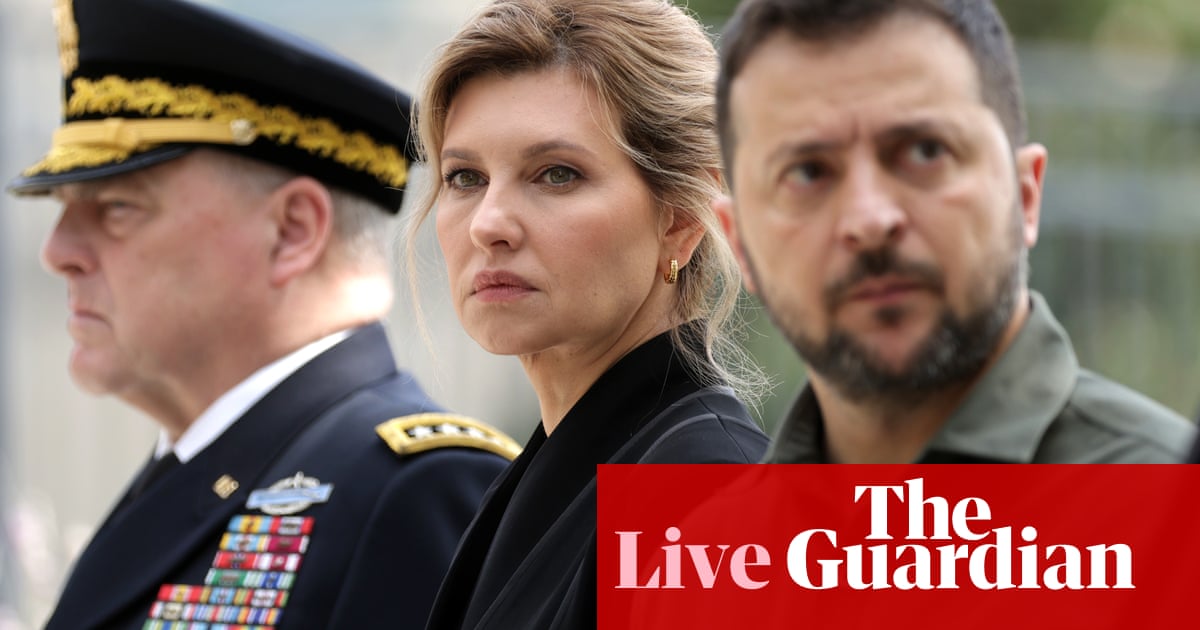
Ukraine’s first lady warns that Ukrainians in "mortal danger" without foreign aid
Ukraine’s first lady, Olena Zelenska, has warned that Ukrainians are in “mortal danger” of being left to die if western countries do not continue their financial support, in an interview with the BBC.
Zelenska made the remarks a day after Republican senators in the US blocked a key aid bill that would have provided more than $60bn worth of support to Ukraine.
Summary
Ukraine’s first lady, Olena Zelenska, warned that Ukrainians are in “mortal danger” of being left to die if western countries do not continue their financial support. Zelenska made the remarks a day after Republican senators in the US blocked a key aid bill that would have provided more than $60bn worth of support to Ukraine.
The Polish government denied reports that the delivery of military equipment to Ukraine was being hindered by protesting Polish truckers blockading the border. “I categorically deny that such a situation occurred,” said Polish vice-minister of national defence, Marcin Ociepa. “Military convoys that cross the border are convoys escorted by military police.”
Avdiivka, the eastern Ukrainian city which has seen some of the most intense fighting of the war, is on the verge of “imminent collapse” to Russian forces, according to a report. A dispatch in The Times by its former Kyiv correspondent said that Ukrainian troops defending the frontline area are “starved of ammunition” and hamstrung in their attempts to repel the advancing enemy soldiers.
Ukraine condemned Russian plans to hold presidential elections next spring on occupied territory, declaring them “null and void” and pledging to prosecute any observers sent to monitor them. Russia’s upper house set the country’s presidential election this week for next March, and chair Valentina Matviyenko said residents in four occupied Ukrainian regions would be able to vote for the first time.
Olympic chiefs were criticised for allowing Russian and Belarusian athletes to compete next year as neutrals, outside of team events and if they do not actively support the invasion.
The Finnish supreme court has blocked the extradition of a Russian neo-Nazi group leader who fought in Ukraine, warning of the risk that he could be susceptible to inhuman treatment, which is precluded under the European convention on human rights.
German chancellor Olaf Scholz has reiterated that the world faced a drawn-out war in Ukraine following Russia’s invasion in February 2022, saying Germany needed to be ready to continue with aid efforts to Kyiv until 2025.
“That is why, if necessary and others are paring back, we must be able to possibly make an even greater contribution,” he said.
We have further photos from the protest in Kyiv by relatives of soldiers held captive by Russian forces.
A group of European parliament members have urged the European commission, and the Polish government, “to act decisively” and end the blockade of border crossings between Poland and Ukraine by protesting truckers.
Lithuanian MEP Andrius Kubilius posted a statement signed by 18 MEPs today on X, which said the blockade “denigrated” the entire EU.
Such a situation is completely unacceptable; it serves only the interests of the Kremlin and seriously damages the reputation not only of Poland, but also of the European Union on the whole.
We therefore appeal to you … to immediately address the issue to act decisively to end the ongoing blockade of Ukraine due to the Polish lorry drivers’ strike.
It did not put forward any suggestions on how that could be achieved. But the most obvious option would be to alleviate the financial concerns of Polish drivers who have said they are now being undercut by as much as 35% by their Ukrainian counterparts.
The Polish government yesterday denied reports that the delivery of military equipment to Ukraine was being hindered by protesting Polish truckers who are blockading the border.
Ukraine may not be able to muster the resources to launch a notable counteroffensive until 2025, western diplomats and military strategists have told the Wall Street Journal.
Kyiv’s forces are now digging in for what could be an extended period of just trying to stop any more Russian advances.
President Volodymyr Zelensky last week ordered the construction of an extensive network of battlefield fortifications to help troops hold the line. On Armed Forces Day on Dec. 6, Zelensky acknowledged the difficulty of the fight to regain occupied territories but urged perseverance. “Is there really an alternative? No,” he said in a video address.
It is a sharp shift in sentiment from earlier this year when Kyiv—buoyed by successes rolling back earlier Russian advances and with an infusion of Western arms—set out to eject Russian troops from the nearly 20% of Ukrainian territory they occupied. Ukraine’s allies hoped it could inflict sufficient damage on Russian forces that President Vladimir Putin would see the war as futile and acquiesce to negotiations acceptable to Kyiv.
The newspaper quoted an infantry sergeant in a frontline position who said that he is not honest about how the war effort is faring in his reports back to people at home. “What is the point?” he said.
Ukrainian officials are pressing on with a campaign to remove Soviet-era monuments as authorities in the capital Kyiv dismantled a statue of a Red Army commander from a central boulevard.
Municipal workers today hoisted the hulking statue of Mykola Shchors, a Ukrainian communist who fought against Ukrainian independence following the Bolshevik revolution, off its pedestal. The structure had occupied a prominent spot on a central artery named after Ukraine‘s national poet. Onlookers stopped to watch and photograph as a giant crane lowered the horse-riding Shchors onto a flatbed truck.
“We need to educate our youth so that they know our history,” said Zoya Kobyliukova, 82, who described communism as a “utopia” that led to many people being killed. “They’re doing the right thing to be taking him down.”
A Kyiv city councillor, Leonid Yemets, told Reuters the statue would be moved to a museum. Authorities in Ukraine‘s Black Sea port of Odesa dismantled a prominent statue of Catherine the Great last year after a months-long campaign by activists.
In somewhat related news, the BBC reports it has seen evidence of several cases in which Russia has detained foreign migrants at its border with Finland and coerced them into joining the army rather than being detained and deported.
The practice of coercing people in pre-deportation detention centres to sign contracts for army service in Ukraine is not new, but the numbers swelled as foreign migrants arrived at Russia’s 1,340-km (833-mile) border with Finland.
Finland temporarily closed all eight of its Russian border crossings, accusing Moscow of channelling migrants and asylum seekers there as part of a destabilisation campaign after the government in Helsinki joined Nato earlier this year.
Analysis of court hearings in Karelia, one of three Russian regions bordering Finland, showed that in the past three weeks, 236 people were arrested for staying in Russia without valid visas, destined for deportation. The picture was similar in the other two border regions of Leningrad and Murmansk.
Among those appearing in court in Karelia was a Somali man in his 40s, who was arrested in mid-November, sentenced to a fine of 2,000 roubles (£17) and detained pending deportation – a standard procedure for anyone without an appropriate visa.
Awad and at least a dozen other inmates held in the pre-deportation centre in Petrozavodsk, Karelia’s capital, were approached by military representatives soon after their arrest and were offered “a job for the state”. They were promised good pay, medical care and permission to stay in Russia on completing a one-year army contract.
Ukrainian border officials are intercepting fighting-age men who are trekking through mountainous regions to escape the country and avoid conscription, the Washington Post reports.
At least 25 men have drowned crossing the Tysa River, which forms part of the border between Ukraine and Romania and Hungary. One 46-year-old man reportedly died last month after getting lost and suffering severe frostbite.
Others are attempting a variety of outlandish techniques to evade capture and sneak out of Ukraine, according to Andriy Demchenko, a spokesperson at the headquarters of the state border guard service. Some have impersonated clergymen, others have dressed as women, and caregivers of disabled people, as well as – more conventionally – hiding in secret compartments in vehicles.
“Honestly, we need more soldiers. The professional military personnel are running out,” said Dolphin, a 68th Brigade assault team leader, last month.
Demchenko said more than 16,000 fighting-aged men have been prevented from leaving Ukraine since the beginning of the war.
Kyiv says IOC allowing Russian athletes is ‘encouraging’ war in Ukraine
Reuters reports that Ukraine has criticised the decision of Olympic chiefs to allow Russian and Belarusian athletes to compete next year as neutrals, outside of team events and if they do not actively support the invasion.
The Ukrainian foreign ministry said:
The members of the International Olympic Committee Executive Board who made this decision bear responsibility for encouraging Russia and Belarus to continue their armed aggression against Ukraine.
Athletes from Russia and Belarus have faced sanctions from a multitude of sports since Moscow launched its assault on Ukraine in February 2022, but a number of sports have eased restrictions over the past year.
Moscow denounced the conditions imposed to take part in the Paris 2024 Olympic Games as “discriminatory” but that athletes who could fulfil them would go.
According to the IOC, 11 athletes - eight Russians and three Belarusians - have so far qualified by meeting the neutrality criteria for the 2024 games.
Kyiv said Russian athletes often represent “sports organisations associated with the armed forces” and that “some of them are on active duty in the Russian military.”
The ruling means welcoming back sportsmen and women who “not only sympathise with the murders of Ukrainian women and children, but are likely to be directly involved in these terrible crimes,” the foreign ministry said.
“The International Olympic Committee has effectively given Russia the green light to weaponise the Olympics,” it added.
Here are some of the latest images coming through from Ukraine:
Afternoon summary
It’s coming up to 2.30pm in Kyiv, here are the day’s main developments:
Ukraine’s first lady, Olena Zelenska, has warned that Ukrainians are in “mortal danger” of being left to die if western countries do not continue their financial support
Kyiv has condemned Russian plans to hold presidential elections next spring on occupied territory, declaring them “null and void” and pledging to prosecute any observers sent to monitor them
Ukraine says its forces have repelled 32 enemy attacks in the town of Avdiivka, which is dominated by a vast coking plant
However, there are reports that the eastern city, which has seen some of the most intense fighting of the war, is on the verge of “imminent collapse” to Russian forces
Ukraine condemns Russian plan to hold presidential elections in occupied territories
Ukraine has condemned Russian plans to hold presidential elections next spring on occupied territory, declaring them “null and void” and pledging to prosecute any observers sent to monitor them.
Russia’s upper house set the country’s presidential election this week for next March, and chair Valentina Matviyenko said residents in four occupied Ukrainian regions would be able to vote for the first time.
Russia claims to have annexed the Donetsk, Luhansk, Zaporizhzhya and Kherson regions in the east and south of Ukraine during referenda last year dismissed by Kyiv and the west as a sham, but does not fully control any of them.
“We call on the international community to resolutely condemn Russia’s intention to hold presidential elections in the occupied Ukrainian territories, and to impose sanctions on those involved in their organisation and conduct,” Ukraine’s foreign ministry said.
It also warned countries against sending observers to the “pseudo-elections”, saying offenders would “face criminal responsibility”. “Any election in Russia has nothing to do with democracy. They serve only as a tool to keep the Russian regime in power,” the ministry said.
Report: Avdiivka on verge of falling into Russian control
Avdiivka, the eastern Ukrainian city which has seen some of the most intense fighting of the war, is on the verge of “imminent collapse” to Russian forces, according to a report.
A dispatch in The Times by its former Kyiv correspondent said that Ukrainian troops defending the frontline area are “starved of ammunition” and hamstrung in their attempts to repel the advancing enemy soldiers.
The shell shortage forces soldiers like Sergeant Taras “Fizruk”, a 31-year-old mortar gunner, also from the 2nd Battalion, to make impossible life and death decisions.
‘We had ten times more ammunition over summer, and better quality,’ he said. ‘American rounds come in batches of almost identical weights, which makes it easier to correct fire, with very few duds. Now we have shells from all over the world with different qualities and we only get 15 for three days. Last week we got a batch full of duds.’
Instead of firing on Russians as soon as they come within range, they have to wait to be sure they are heading for their positions, and only hit large groups.
‘We should be controlling our sector from 4km away, so we can kill a few hundred Russian soldiers before they get to our infantry and we only take a few wounded,’ he said. ‘But without ammunition we can’t. When it’s two or three soldiers I’m not shooting any more, only when it’s a critical situation, say ten guys close to our infantry. If our rounds aren’t the same weight, the next round will fly two hundred metres past the Russians. And then it’s too late.’
Russia has said it is looking into whether its frozen gold reserves, taken after the country invaded Ukraine, could be used to supply the climate damage fund to help developing countries.
In what Reuters said appeared to represent an attempt to try to fulfil Moscow’s aim of doing “everything possible” to stop the West from seizing its frozen reserves, Russia’s climate envoy said at the Cop28 summit the move would help to close the gap between developed and developing countries in dealing with climate change.
It is unlikely to be agreed upon. The west froze around half – or more than $300 billion – of Russia’s international reserves after Moscow sent its armed forces into Ukraine in February last year.
Kyiv wants the proceeds from Russian frozen assets to be used to help rebuild the country - something many in the West want to happen but which has been complicated by legal questions and the move’s possible future ramifications.
“We are ready to announce that Russia is looking into the voluntary contribution of finance to the loss and damage fund from the frozen national gold reserves held by international organisations,” Ruslan Edelgeriev, Russia’s climate representative, said on the main stage at Cop28 in Dubai. “It is a step dictated by the need to close the gap between developing and developed countries.”
As support for US aid falters and an election looms, the White House needs a narrative based on reality, not rhetoric, says Emma Ashford, a senior fellow with the Reimagining US Grand Strategy programme at the Stimson Center, Washington DC.
As a recent Washington Post exposé highlighted, Ukrainian forces didn’t meet even the minimum bar for success in that campaign. Troops were hobbled by a mismatch between US and Ukrainian views of strategy, some poor tactical decisions on the part of the Ukrainian leadership, and Russian defensive fortifications that proved far more solid and effective than expected. In early November, Ukraine’s top general, Valerii Zaluzhnyi, admitted to an interviewer that the war was at a stalemate.
After 18 months of triumphalist rhetoric, reality is beginning to set in. Now policymakers in Kyiv and their western partners must answer some challenging questions: how much territory can Ukraine realistically recover through military means? How long will western public opinion continue to support funding the war? When does failure to invest in our defence industrial base mean that our stockpiles are insufficient to resource Ukraine?
The Polish government has denied reports that the delivery of military equipment to Ukraine was being hindered by protesting Polish truckers who are blockading the border.
The Polish vice-minister of national defence, Marcin Ociepa, told local media yesterday:
I categorically deny that such a situation occurred. Military convoys that cross the border are convoys escorted by military police. They pass in a completely different way, [the same] as emergency vehicles, and are not hostages of any protests.
Over the past two months, Polish lorry drivers have blocked three border crossings with Ukraine. On 26 November, they expanded their protest by including Medyka, a key transportation hub. Slovakia has followed suit, with local lorry drivers staging their own blockade since Friday near the Ukrainian city of Uzhhorod.
According to Ukrainian drivers, the line from the Medyka crossing now stretches about 70km (45 miles), all the way to the south-eastern Polish city of Rzeszów. Around 2,500 lorries are moving as little as half a kilometre every nine hours, my colleague Luke Harding reported this week.
In December 2021, a former primary school teacher in the UK was introduced to a beautician, Anastasia, in Ukraine, who would carry her baby. Dorothy, then 43, and her husband, Charlie, had been trying to conceive for eight years. When the last attempt ended in miscarriage, a consultant had suggested surrogacy.
Dorothy was touched by Anastasia’s empathy. Anastasia thought Dorothy had “good energy”. They agreed to work together: Dorothy and Charlie’s DNA, Anastasia’s body, at a cost of £43,000. They expected then to never to see or talk to each other again (the agency which connected them recommended this “for their own protection”).
But even as they spoke, the world they inhabited was spinning out of control. Approximately 100,000 Russian troops were gathered on the border of Ukraine. When Russia invaded, on 24 February 2022, 42 British babies were being carried by Ukrainian surrogates. Anastasia was one of them. This is the story of what happened to the surrogacy industry amid that chaos – and the extraordinary steps Dorothy and Charlie took to keep Anastasia and the baby safe.
EU countries may soon be able to halt their last remaining Russian gas imports under plans to ban Russian energy companies from their pipelines and terminals.
The European Council and parliament have agreed new rules that could empower the EU’s member states to crack down on companies from Russia and Belarus that have continued to import Russian gas into Europe since Moscow’s full-scale invasion of Ukraine by buying import capacity at key EU import terminals and pipelines.
The provisional agreement is expected to be endorsed and adopted by both institutions, which will mark the last stage in the legislative process before the plans are put to a vote by MEPs sometime next year.
The European Council said the proposals aim to protect the “essential security interests of the member states of the EU, while taking account of security of supply and diversification objectives”.
If formally approved, the proposed legislation would make it possible for the owners of EU gas import infrastructure to sever their ties with the companies still importing Russian gas without facing steep financial penalties for breaking their contracts.
The new rules would also help pave the way for the EU to reduce its last remaining gas imports from Russia, which had been Europe’s biggest supplier of gas for decades before the war in Ukraine began in February last year.




